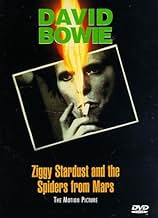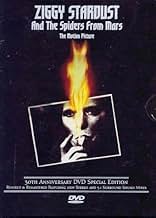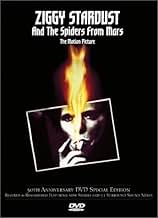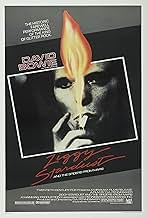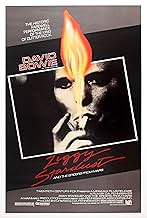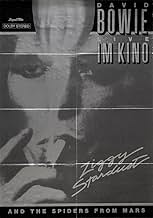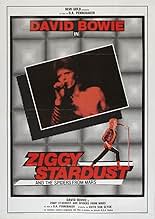IMDb RATING
7.5/10
3.1K
YOUR RATING
David Bowie performs as his alter ego Ziggy Stardust for the very last time at the Hammersmith Odeon, London on July 3, 1973.David Bowie performs as his alter ego Ziggy Stardust for the very last time at the Hammersmith Odeon, London on July 3, 1973.David Bowie performs as his alter ego Ziggy Stardust for the very last time at the Hammersmith Odeon, London on July 3, 1973.
Mick Woodmansey
- Self - Drums
- (as Mick Woodmansy, Woody Woodmansey)
Angie Bowie
- Self
- (uncredited)
Maureen Starkey
- Self
- (uncredited)
Ringo Starr
- Self
- (uncredited)
Featured reviews
This concert film is probably most famous for capturing a pivotal moment in music history. It is the last show that David Bowie performed under the Ziggy Stardust persona and the last time he was on stage with his backing band The Spiders From Mars. Seemingly his announcement near the end of the show stating that this was the final appearance was not only news to the audience but to the band as well!
The film takes the form mostly as straightforward concert footage. There is also some backstage material interspersed throughout which I think it would have been good to have had more of, seeing as it revealed a little bit more of what Bowie was like behind the mask. But as it was, the vast majority of material is taken from the concert. The approach taken is very stripped down and basic. There isn't really a lot of imagination in the approach but I guess the idea was to let the show speak for itself. Perhaps though it might have been better for a live performance by such a flamboyant performer as Bowie to be presented with a little more imagination. Sometimes, it's the audience reactions to the show that are truthfully the most interesting, seeing as some of his fans seem to be almost hyper-ventilating with emotion. Some of the costume changes now provoke a chuckle or two; although, in truth, I have always found the fashions of the 70's glam rock era to be absolutely catastrophic. But at the end of the day it is a time capsule film and in this sense it is interesting. Even if Bowie does feel the need to do a mime artistry routine.
The concert itself? One for Bowie devotees especially I would say, of which I am not one I have to admit. But I thought Mick Ronson was very good on guitar and they all do knock out the tunes with some energy. It was also interesting to hear a good version of The Velvet Underground's White Light/White Heat close the show.
The film takes the form mostly as straightforward concert footage. There is also some backstage material interspersed throughout which I think it would have been good to have had more of, seeing as it revealed a little bit more of what Bowie was like behind the mask. But as it was, the vast majority of material is taken from the concert. The approach taken is very stripped down and basic. There isn't really a lot of imagination in the approach but I guess the idea was to let the show speak for itself. Perhaps though it might have been better for a live performance by such a flamboyant performer as Bowie to be presented with a little more imagination. Sometimes, it's the audience reactions to the show that are truthfully the most interesting, seeing as some of his fans seem to be almost hyper-ventilating with emotion. Some of the costume changes now provoke a chuckle or two; although, in truth, I have always found the fashions of the 70's glam rock era to be absolutely catastrophic. But at the end of the day it is a time capsule film and in this sense it is interesting. Even if Bowie does feel the need to do a mime artistry routine.
The concert itself? One for Bowie devotees especially I would say, of which I am not one I have to admit. But I thought Mick Ronson was very good on guitar and they all do knock out the tunes with some energy. It was also interesting to hear a good version of The Velvet Underground's White Light/White Heat close the show.
I just got back from seeing the restored version of Ziggy Stardust and the Spiders from Mars and I have to say I was pleasantly surprised. Though the concert film does have some shortcomings as mentioned in other reviews what it does have going for it is the music. The clarity of the music being played is extraordinarily clear and powerful. The band is tight and Mick Ronson plays his ass off. I never new he played so well. In addition, Jeff Beck makes a cameo appearance and plays two songs with the band. Jeff Beck plays a couple of cool solos as well. Though most of the focus is on David and Mick we get the full concert from beginning to end with a couple of backstage shots. If you are even a bit interested go see it. You won't be disappointed.
D A Pennebaker had already filmed icons like Dylan and Lennon before getting the gig to film David Bowie's "farewell" concert at London Hammersmith Odeon in July 1973. Bowie was huge in Britain at the time but had yet to break America which makes me tend to think the assignment came to him rather than the other way round.
Actually as a great fan of glam rock back in the day (being 13 at the time of the movie's shooting date, how could I not be, 1972-73, being glam's heyday here), I do remember the fuss about this being Bowie's last show, giving the concert great curiosity, not to mention envy value at the time to fans in the sticks like me. To discover that this historic show was captured in full was a great and welcome surprise to me.
That said, the film-maker's approach to the concert is pretty conservative actually as we get a little bit of pre-show scene-setting, with Bowie getting made-up in his dressing room, chatting to his wife Angie, while cutting in scenes of his adoring, often lookalike fans outside. Without too much delay, however, the show's on and Bowie and his band, the latter brilliantly led by Mick Ronson on lead guitar, tear into a great set, culminating in the famous, if misleading "This is our last show" quote and the bathetic euphoria which greets final song "Rock and Roll Suicide".
In between, we get four costume changes, a goodly selection of numbers from his just-released "Aladdin Sane" album (but no "Jean Genie" sadly!), plenty, naturally from the "Ziggy Stardust" album but also tracks from some of his earlier albums. Unlike other rock-movies by the Rolling Stones and Led Zeppelin, Bowie and the band are on fine form, with confidence exuding from the singer's every phrase and move.
Yes, some tracks go on too long, it was a shame that two of his best tunes ("All The Young Dudes" and "Oh! You Pretty Things) get rather thrown away in a medley, but against that there are great covers of Jacques Brel's "My Death" and the Velvets' "White Light White Heat", although I'm still undecided at what to make of the somewhat ridiculous mine-sequence during an almost never-ending version of "Wild Eyed Boy From Freecloud". Pennebaker's editing is adequate if, as I say, unimaginative, making the most of the no doubt limited camera numbers available to him, but thereafter just cutting from Bowie and Ronson (you barely see the rest of the band) to the ecstatic audience. Somehow Ringo Starr, director of Bowie friend and rival Marc Bolan's "Born To Boogie" movie the previous year, appears in Bowie's dressing room between songs casting an envious eye no doubt on a missed opportunity behind the lens again.
Anyway, I was rapt by this exciting glimpse of a top artist on top form, masterminding his destiny to a "T", delivering a great rock and roll show in the process.
What of course differentiates this show to contemporary rock concerts is that Bowie treats the performance itself as musical theatre, quite literally, a performance artist if ever there was one.
Actually as a great fan of glam rock back in the day (being 13 at the time of the movie's shooting date, how could I not be, 1972-73, being glam's heyday here), I do remember the fuss about this being Bowie's last show, giving the concert great curiosity, not to mention envy value at the time to fans in the sticks like me. To discover that this historic show was captured in full was a great and welcome surprise to me.
That said, the film-maker's approach to the concert is pretty conservative actually as we get a little bit of pre-show scene-setting, with Bowie getting made-up in his dressing room, chatting to his wife Angie, while cutting in scenes of his adoring, often lookalike fans outside. Without too much delay, however, the show's on and Bowie and his band, the latter brilliantly led by Mick Ronson on lead guitar, tear into a great set, culminating in the famous, if misleading "This is our last show" quote and the bathetic euphoria which greets final song "Rock and Roll Suicide".
In between, we get four costume changes, a goodly selection of numbers from his just-released "Aladdin Sane" album (but no "Jean Genie" sadly!), plenty, naturally from the "Ziggy Stardust" album but also tracks from some of his earlier albums. Unlike other rock-movies by the Rolling Stones and Led Zeppelin, Bowie and the band are on fine form, with confidence exuding from the singer's every phrase and move.
Yes, some tracks go on too long, it was a shame that two of his best tunes ("All The Young Dudes" and "Oh! You Pretty Things) get rather thrown away in a medley, but against that there are great covers of Jacques Brel's "My Death" and the Velvets' "White Light White Heat", although I'm still undecided at what to make of the somewhat ridiculous mine-sequence during an almost never-ending version of "Wild Eyed Boy From Freecloud". Pennebaker's editing is adequate if, as I say, unimaginative, making the most of the no doubt limited camera numbers available to him, but thereafter just cutting from Bowie and Ronson (you barely see the rest of the band) to the ecstatic audience. Somehow Ringo Starr, director of Bowie friend and rival Marc Bolan's "Born To Boogie" movie the previous year, appears in Bowie's dressing room between songs casting an envious eye no doubt on a missed opportunity behind the lens again.
Anyway, I was rapt by this exciting glimpse of a top artist on top form, masterminding his destiny to a "T", delivering a great rock and roll show in the process.
What of course differentiates this show to contemporary rock concerts is that Bowie treats the performance itself as musical theatre, quite literally, a performance artist if ever there was one.
Don't come expecting plot: Ziggy Stardust and the Spiders from Mars is just a concert film, recorded at the last show of David Bowie's "Ziggy Stardust" tour at the Hammersmith Odeon in London, July 3rd, 1973. However, to say it's _just_ a concert film doesn't quite cover the bases... Let's be blunt: if you like the idea of the 26-year-old Bowie in a skimpy satin tunic and boots, growling into a microphone and spreading his thighs for the fans, then you're going to love this film. If that idea does nothing for you -- and, frankly, if it doesn't then I think you're missing one of life's great kicks -- then you're not the target audience.
I should add that there are also five or six costume changes, some amusing backstage conversation, plenty of shots of the audience (apparently mostly fourteen-year-old girls in varying states of sexual ecstasy), and some rather scorching extended solos from lead guitarist Mick Ronson. Oh, yes: and I shouldn't forget to mention that Bowie's showmanship is amazing and the musical performances range from interesting to excellent -- there's a truly fabulous version of "Cracked Actor," for instance, with Bowie maintaining a surprising level of fierceness while playing harmonica and draped in a satin kimono.
Beyond the music -- "Ziggy" staples like "Changes," "Space Oddity," "My Death," "All The Young Dudes," etc., as well as covers of the Rolling Stones' "Let's Spend The Night Together" and Lou Reed's "White Light, White Heat" -- the visual imagery is what really makes this interesting. The come-hither hip-shaking of "Moonage Daydream," or the guitar-sex-flavored performance of "Time" (with Bowie in unitard, garter and feather boa), all make this a fantastic education in what Bowie's original aesthetic -- and sex appeal -- were all about.
Personally, I think this is a _Gesamtkunstwerk_ -- that is, a total work of art -- and should probably be beamed into outer space for the aliens to have fun with. But you can probably figure out which segment of the audience I fall into.
P.S.: By the by, Todd Haynes' Velvet Goldmine made a hell of a lot more sense after I'd seen this film.
I should add that there are also five or six costume changes, some amusing backstage conversation, plenty of shots of the audience (apparently mostly fourteen-year-old girls in varying states of sexual ecstasy), and some rather scorching extended solos from lead guitarist Mick Ronson. Oh, yes: and I shouldn't forget to mention that Bowie's showmanship is amazing and the musical performances range from interesting to excellent -- there's a truly fabulous version of "Cracked Actor," for instance, with Bowie maintaining a surprising level of fierceness while playing harmonica and draped in a satin kimono.
Beyond the music -- "Ziggy" staples like "Changes," "Space Oddity," "My Death," "All The Young Dudes," etc., as well as covers of the Rolling Stones' "Let's Spend The Night Together" and Lou Reed's "White Light, White Heat" -- the visual imagery is what really makes this interesting. The come-hither hip-shaking of "Moonage Daydream," or the guitar-sex-flavored performance of "Time" (with Bowie in unitard, garter and feather boa), all make this a fantastic education in what Bowie's original aesthetic -- and sex appeal -- were all about.
Personally, I think this is a _Gesamtkunstwerk_ -- that is, a total work of art -- and should probably be beamed into outer space for the aliens to have fun with. But you can probably figure out which segment of the audience I fall into.
P.S.: By the by, Todd Haynes' Velvet Goldmine made a hell of a lot more sense after I'd seen this film.
This concert-film, mixed with concert footage, backstage looks and interview clips, highlights Bowie at his best. It is situated in a rock era that was actually coming to an end. Glam-rock was a new style that was very hot in the UK and it got its start in 1971. It would be the style that would help Bowie launch his career from performer to star. It was a style that would end its own reign by 1975. Bowie, after a slow start in the late 60s, would work in experimental music and styles. He again emerged in 1972 as the colorful and asexualized, alter ego, Ziggy Stardust. Complete with, psychedelic colors, gritty film stock and lot of awesome rock-and-roll, this film is an androgynous, flamboyant spectacle.
Be aware that this film is listed as 1983 also, because it was released in 1973, but only in a few theaters and film-festivals. It wasn't until Bowie got really huge in the 80s that the film was re-released ten years later. The film had a number of problems with the shooting of the concert. Director D. A. Pennebaker, who was only planning on shooting 20 minutes' worth of the concert, was so taken in by Bowie's amazing aura on stage, that they changed plans and shot the whole thing. Unfortunately, that caused extra challenges due to lack of cameramen, audio issues and lighting problems between the stage and the audience.
His simple solution for the lighting was telling everyone to take as many photos as possible so the flashes would help with the lighting issue. The initial release of the film in 1973 was deemed a sloppy mess. Even Bowie, who said in the film, that this was their last appearance as the Spiders From Mars, who would bail on the Ziggy persona a year or two later, lost interest in the film, because of the delays in getting the technical issues fixed, until they were able to clean things up for the 1983 re-release.
If you ask me those technical issues are what make this film so great. The grittiness of the film grain, because of the low light, the streakiness of the lights and colors, because of the film stock and the edgy, vinyl recording sound, all help to create this mood that I feel Bowie was trying to convey.
Bowie is all smiles throughout this film too. He obviously is having a lot of fun and thoroughly enjoys his craft. Even in moments when things get serious you still feel a playful positive mood coming off of him and out of the screen. His talent is beyond amazing, especially when you consider this was very early in his career. They do an amazing version of Space Oddity. All the songs are well done. This is a definitive version of what a cool concert film can be and it is even more interesting when you think about the fact that he would have an even more amazing career for the next 40 years after this.
7.8 (B- MyGrade) = 8 IMDB.
Be aware that this film is listed as 1983 also, because it was released in 1973, but only in a few theaters and film-festivals. It wasn't until Bowie got really huge in the 80s that the film was re-released ten years later. The film had a number of problems with the shooting of the concert. Director D. A. Pennebaker, who was only planning on shooting 20 minutes' worth of the concert, was so taken in by Bowie's amazing aura on stage, that they changed plans and shot the whole thing. Unfortunately, that caused extra challenges due to lack of cameramen, audio issues and lighting problems between the stage and the audience.
His simple solution for the lighting was telling everyone to take as many photos as possible so the flashes would help with the lighting issue. The initial release of the film in 1973 was deemed a sloppy mess. Even Bowie, who said in the film, that this was their last appearance as the Spiders From Mars, who would bail on the Ziggy persona a year or two later, lost interest in the film, because of the delays in getting the technical issues fixed, until they were able to clean things up for the 1983 re-release.
If you ask me those technical issues are what make this film so great. The grittiness of the film grain, because of the low light, the streakiness of the lights and colors, because of the film stock and the edgy, vinyl recording sound, all help to create this mood that I feel Bowie was trying to convey.
Bowie is all smiles throughout this film too. He obviously is having a lot of fun and thoroughly enjoys his craft. Even in moments when things get serious you still feel a playful positive mood coming off of him and out of the screen. His talent is beyond amazing, especially when you consider this was very early in his career. They do an amazing version of Space Oddity. All the songs are well done. This is a definitive version of what a cool concert film can be and it is even more interesting when you think about the fact that he would have an even more amazing career for the next 40 years after this.
7.8 (B- MyGrade) = 8 IMDB.
Did you know
- TriviaJeff Beck guested on guitar in two songs and was supposed to have been in the film, but asked not to appear in it because he felt his solos and his appearance, looking more like a '60s blues rocker than Bowie and the Spiders' theatrical outfits didn't quite fit the movie. His performances have been added to the film for its 50th anniversary re-release.
- Quotes
David Bowie: What do you know about make-up? You're Just a Girl.
- Alternate versionsThe 50th anniversary re-release has been restored in 4K picture and sound, and features two previously un-released songs featuring Jeff Beck in the encore (specifically "The Jean Genie" and "Round and Round").
- ConnectionsEdited into In Concert: Bowie '73 with the Spiders from Mars (1974)
- How long is Ziggy Stardust and the Spiders from Mars?Powered by Alexa
Details
- Release date
- Country of origin
- Language
- Also known as
- Bowie '73 with the Spiders from Mars
- Filming locations
- Hammersmith Odeon, Hammersmith, London, England, UK(concert venue)
- Production companies
- See more company credits at IMDbPro
Box office
- Gross US & Canada
- $162,547
- Opening weekend US & Canada
- $6,816
- Jul 14, 2002
- Gross worldwide
- $434,721
Contribute to this page
Suggest an edit or add missing content


